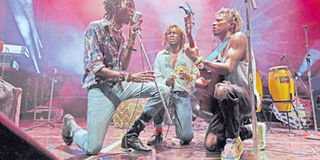Sauti za Busara festival set to downsize in 2021

H_art the Band from Kenya at a past Busara fest. PHOTO| FILE
What you need to know:
For four nights those in attendance are entertained to a rich list of African jamz under the African skies at aunique and historic setting of the Ngome Kongwe (Old Fort) in Stone Town.Zanzibar.
Sauti za Busara is considered to be one of the best music festivals in Africa and over the past 17 years it has been one of the major dates on the entertainment calendar attracting visitors from across the world.
For four nights those in attendance are entertained to a rich list of African jamz under the African skies at aunique and historic setting of the Ngome Kongwe (Old Fort) in Stone Town.Zanzibar.
It is as acclaimed by media outlets such as CNN and the BBC, a truly international festival organized to suit almost everybody.
But the outbreak of the Covid-19 pandemic has set in a new normal and festival organizers have decided to reduce the number of days for the 2021 edition of the festival.
According to festival director Yusuf Mahmoud, the festivals next edition will be held for two days instead of the usual four days.
“With the prevailing uncertainties globally relating to the Covid-19 pandemic, elections in Tanzania and associated challengesin raising business sponsorships, Busara Promotions’ management and board members decided to downsize the next Sauti za Busara festival in February 2021 to a two-day edition,” says Yusuf Mahmoud.
Adapting to the new normal
Despite theglobal uncertainty, he says Sauti za Busara 2021 intends to proceed as a step towards the nation’s social, cultural and economic recovery.
With the well-being of artists, visitors and the local population as their main concern, organisers will continue to monitor and assess the Covid-19 situation, together with local authorities. They do not plan to enforce wearing of face masks or social distancing at the event, but other safety measures will be in place including handwashing stations and temperature checksat entrances and exits.
Apart from the days, organizers have also reduced the number of groups that will perform at the next edition with more attention being given to East African artists.
“Fourteen groups are being confirmed to perform on the main stage in the Old Fort during Friday 12 – Saturday 13 February 2021, including artists from Tanzania, Uganda, South Africa, Mozambique, Reunion, Ghana, The Gambia, Morocco and Algeria,” says the festival director. As part of the changes they will have only one main stage as oppsed to the nusual three.
The festival, however, has plans to offer free performances for the wider public and other Busara Xtra events, as hosted by hotels, clubs and community organisations.
But even as organizers promise that nothing will change in terms of test there are sections that feel the two days are not enough, something that Mr Mahmoud says it all comes to costs “More days means increased costs: for artistes, crew, venues, equipment, accommodation and so on, yet, Sauti za Busara aims to remain affordable for the local population.
To complement ticket income, the festival continues to be partially reliant on support from donors and sponsors,” says Yusuf Mahmoud.
Economic impact
The decision to downsize the next edition will inevitably have ripple effects on the Zanzibar economy. Analysis of the festival’s 17 years of existence found an economic impact of $90 million. The annual festival attracts tourists and visitors who spend money within the community, which strengthens the grassroots economy. Each year, including artists, the festival typically employs more than 800 people, prioritizing local personnel for crucial roles in artist management, administration, media, security,cleaning, technicians, ticketing and merchandise. “Most of our crew are locals,” says Yusuf Mahmoud. “Also, many more are indirectly employed, such as food and drinks vendors, hotel and restaurant staff, boda boda and taxi drivers, tour operators, equipment providers, community police and so on.
With a smaller event in 2021, sadly the jobs created will be fewer, though still significant.” With the impacts of Covid-19, since March 2020 the local economy which almost solely depended on tourism was devastated, with only a few tourist arrivals until recent weeks.
Although flights and hotels are now beginning to reopen, responses from local business owners that previously supported the festival say due to heavy losses, this time they are unable to contribute.
With new leadership in Zanzibar after October’s elections, the festival also intends to lobby government authorities to support arts and culture.
According to Yusuf Mahmoud, for this to happen they need to prove with unquestionable data the many ways that music and thearts contribute to society. “For example, festivals in Zanzibar market the destination globally, attract visitors in large numbers, keep our heritage alive, create jobs, build skills, reduce poverty and build respect for cultural diversity. Music is a universal language that communicates heart-to-heart and recognizes no borders,” Mahmoud says.




